I SWEAR Chickens are Hip
May 7, 2009
New York Times: http://www.nytimes.com/2009/05/07/garden/07starter.html
Dallas Observer:http://blogs.dallasobserver.com/unfairpark/2009/05/friend_of_the_show_leslie.php
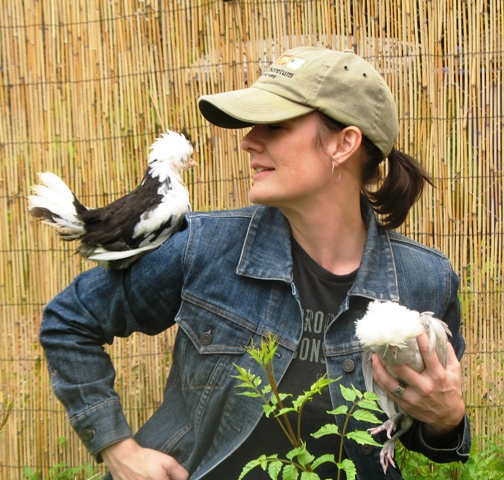
May 7, 2009
New York Times: http://www.nytimes.com/2009/05/07/garden/07starter.html
Dallas Observer:http://blogs.dallasobserver.com/unfairpark/2009/05/friend_of_the_show_leslie.php

May 4, 2009
My new little flock of chickens has been quite the adventure...they are a hoot. For the first few days, while they were getting used to their new surroundings, they were quite docile and easy to catch. The Polish hens would ride around on my shoulder no problem. However, they seem to have gotten a bit more skittish since. I think they are still getting used to having a "free range" environment and perhaps feel a bit vulnerable. They have, however, discovered gourmet greens....LOL..when I pull bolting lettuce out of the garden for them, they actually come running to me for it and will eat it out of my hands. They seem to prefer the lighter colored more tender greens (noooo, they're not picky...). Unfortunately, the little gray Ameraucana...named Scooter...has developed a case of lice. Yuck...so I'm trying to get her treated. Hopefully I can get her bouncing back soon. I've yet to name the two largest hens..but here are some updated photos.
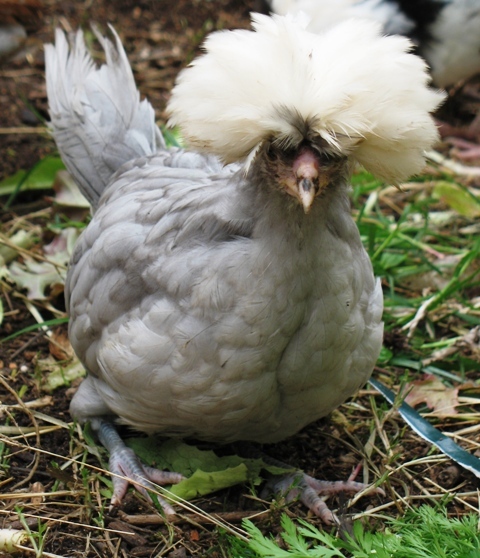
Phyllis the Chicken
PC: Leslie F. Halleck
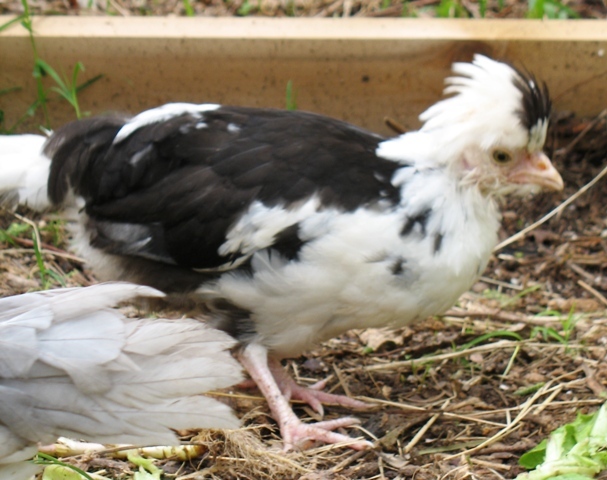
Baby Einstein the Houdan
PC: Leslie F. Halleck
"Phyllis" and "Einstein" - with all the rain we've had the last few weeks, these gals have had a time of it keeping their hair did...you should see them all soggy and floppy haired...pathetic!
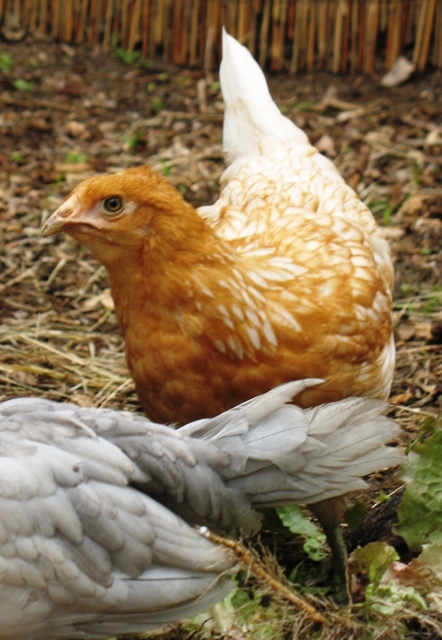
PC: Leslie F. Halleck
Unnamed 1 and Unnamed 2 - The gal on the left is the biggest and oldest of the bunch. Definitely queen of the roost. She's awfully pretty and the least timid about coming to me when I have food she wants. The rest seem to follow her lead. The gal on the right came to me with some pecked out spots on her neck and tail...obviously getting picked on by some of her previous neighbors. Kind of surprising considering she's got some size on her. But since coming home with me she's started to grow some new feathers on her behind. Should be pretty once they're in.
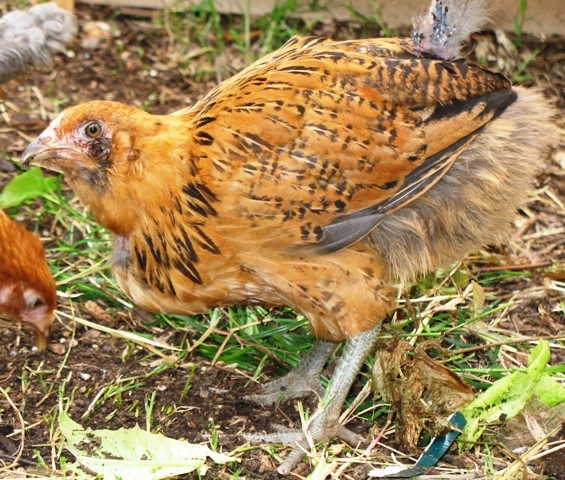
Little Scooter
PC: Leslie F. Halleck
And...poor little Scooter...she's just not happy...I've treated her and all the others with DE...scrubbing out the roost...etc. I'll probably have to smear her up with Vaseline this week. Lice are gross....now, wish me luck that I don't "catch" them! UPDATE: Scooter is much improved. After a couple of treatments of DE she is all of a sudden her perky self again. Appetite is back full force and she's scooting all over the place. They all still have a few mites on them so we followed up with what we felt was a necessary treatment of permethrin to nip the population in the bud. Scooter seems to be the most docile of the bunch and just may end up being my little sweet heart...
May 1, 2009
Here are a few shots of some April bloomers from the garden. Rose 'Pat Austin'...barely a drop of blackspot in sight, which is quite the achievement this spring! I have to say, I think this is probably my favorite rose. Well, I say that today, but it's so hard to choose just one. Iris 'Orange Glaze' next to Rose 'Mme. Franziska Krueger'. this iris also has a lovely fragrance.
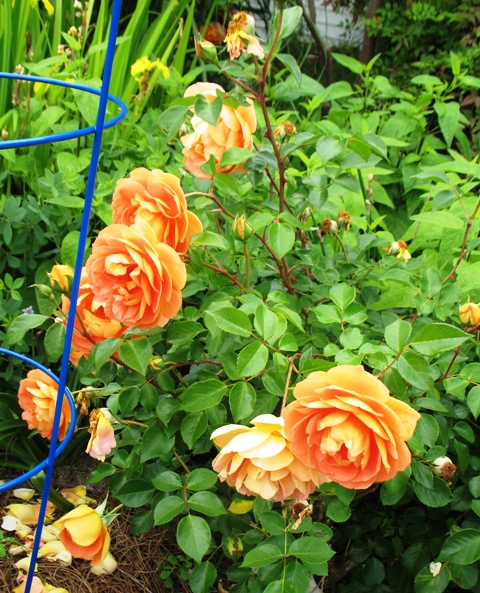
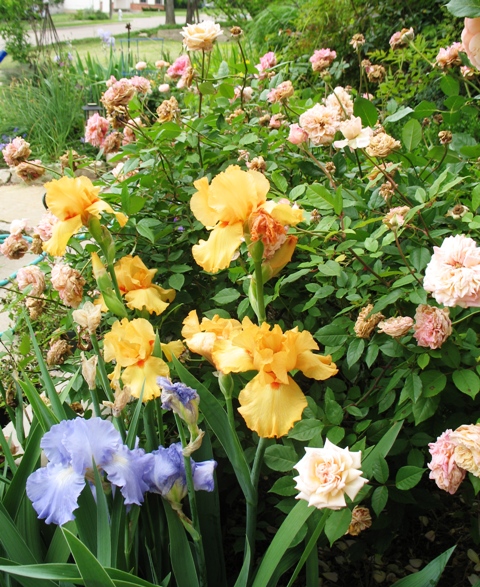
A nice purple combo of 'Carpet Purple' petunia, Salvia farinacea, Mexican feather grass and dusty miller with Rose 'Perle d' Or' in the background. Bronze fennel flanked by 'Butterfly Blue' Scabiosa and petunia.
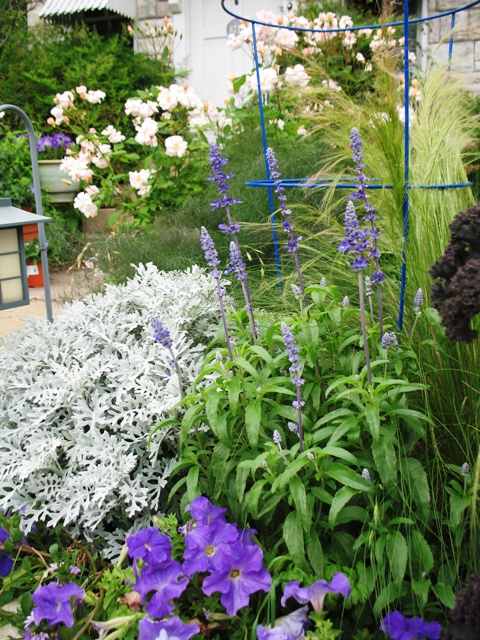
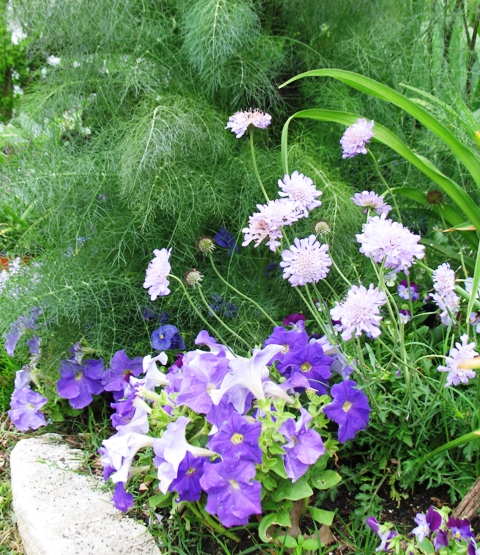
Can't forget Hairyette Potter...planted with Mexican Feather grass
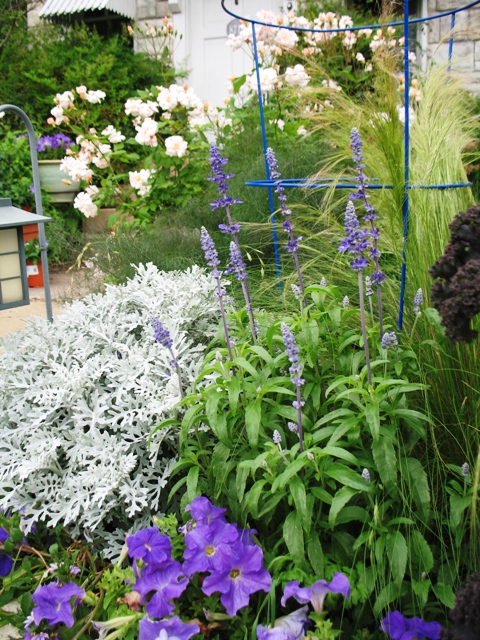
April 28, 2009
There are so many things going on in my garden right now I'm having a hard time deciding what to post about. I have some great shots of shelling and cooking fava beans...but I might save that for my next mag article. The roses have been glorious. I'll post some new shots of them soon. My 'Pat Austin' has been so beautiful this spring and 'Perle d' Or' is overflowing with blooms. What to post, what to post...
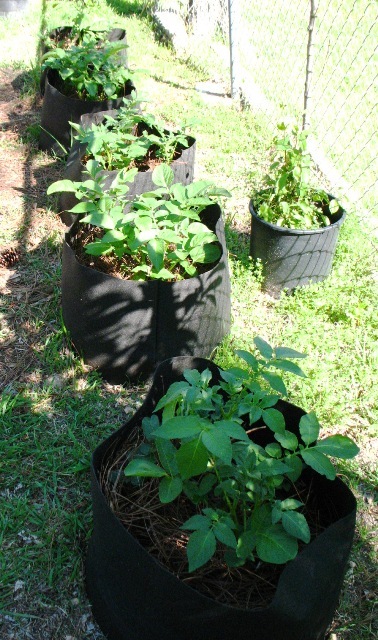
So I'll update you on the potatoes. These are the fiber potato growing bags I'm testing. Despite all the cool, rainy humid weather we've been having this spring, the potatoes are quite happy. I know I might be jinxing myself by saying this, but no fungal issues in sight...so far...at the moment...knock on particle board! This year I planted 'Yukon Gold' and, I think...'Kennebec'. I'm really blanking out on the varieties right now. I've been using these bags for 2 years now and they are still in excellent condition. No break down on them yet. The potatoes have been hilled up twice so far. I'm hoping for a bang up crop of 'Yukon Golds' this year...they are sooooo good.
If you haven't used bags or container of some kind to grow potatoes before, you simply start out by filling the bottom 1/3 of the container with a loose compost soil mix, plant your seed potatoes (not too deep - and dust them with garden sulfur first). Then when the shoots are about 6-8 inches tall, begin to hill them up with a mixture of pine straw and compost. You fill this mixture in right up against the stems of your plants, 3-4 inches at a time. This is where the potatoes will develop so it needs to be loose but protected from light. Continue to hill up until you've reached the top of the pot. Then your plants will usually start blooming early summer, which means they are starting to produce potatoes. Don't water plants too much in the early spring if you're getting rainfall. Potatoes are very susceptible to fungal diseases. Water at the base of the plants rather than on the foliage and only in the early morning. You can pull away the mixture to harvest baby potatoes in early summer (make sure to put back the straw) or wait to harvest in late fall for the bigger potatoes. Foliage will begin to yellow in late fall once cooler temps arrive, at which time you'll stop watering plants, allow the foliage to die down, then simply dump out the container to harvest your spuds. MMMMM, mashed potatoes.
April 25, 2009
So, I'm still working on planting up the new large bed in the backyard. Still have a way to go, but it's shaping up. I can't quite get a good photo of the entire bed due to it's size, but you get the idea. I've added some new Heuchera 'Georgia Peach', Tiarella 'Iron Butterfly', Hosta 'Krossa Regal' and some fabulous Agapanthus. I also transplanted a small 'Crimson Queen' Japanese Maple from another part of the yard.
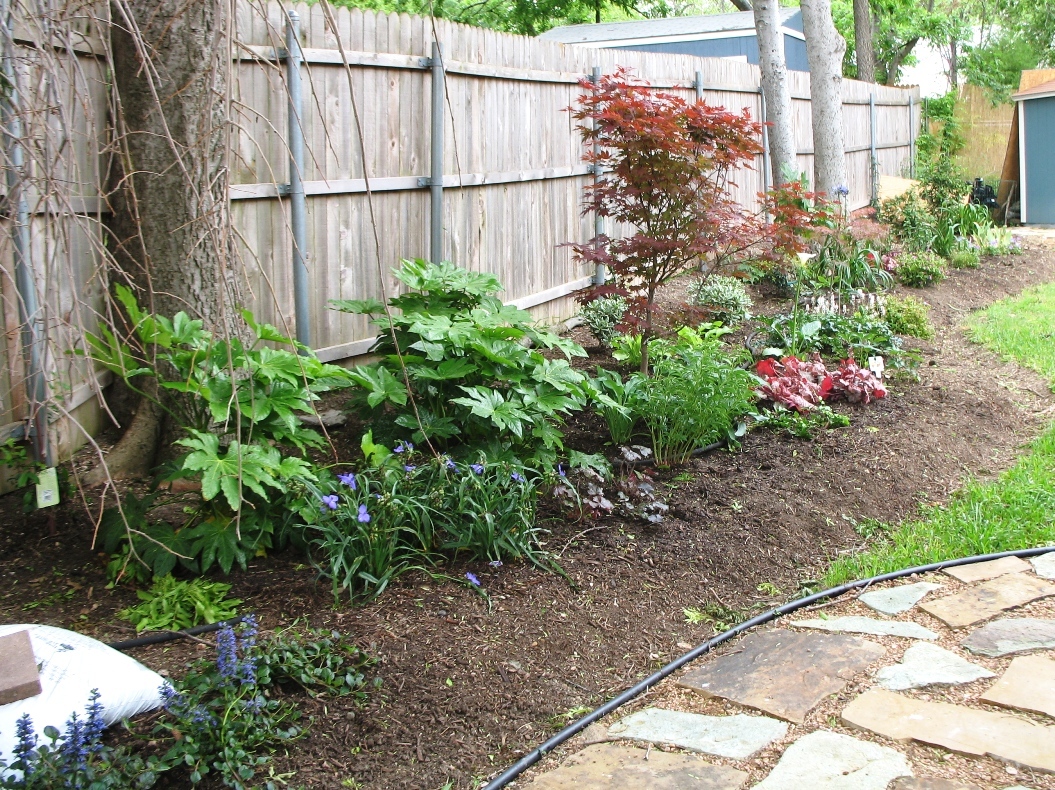
April 22, 2009
Happy Earth Day! OH...and this is my 100th blog post...so happy 100th post day! I'm home sick today, so what better time to update the blog? Here are a few shots of what's going on in the veggie garden.
I've been harvesting fava beans - bucket loads of them. This photo shows about the third of three large buckets I picked this past weekend. I've since pulled up all the plants, and they'll now make a great addition to the compost. Sugar snap peas are popping up all of a sudden. Yum...
We've had oodles of strawberries this year, both in pots and beds. Hopefully, we'll be able to eat enough of them before the birds get to them! They taste absolutely wonderful. There's nothing like homegrown strawberries...
We still have plenty of salad greens coming on, and the pole beans and bush beans are popping up...
April 18, 2009
I was a little worried about capturing these somewhat stubborn leghorns this morning for their journey back to East Texas. But, somehow, I managed to catch two of them at once, then rounded up the third in short order. My stealth chicken wrangling skills are improving...so anyway, thanks gals!
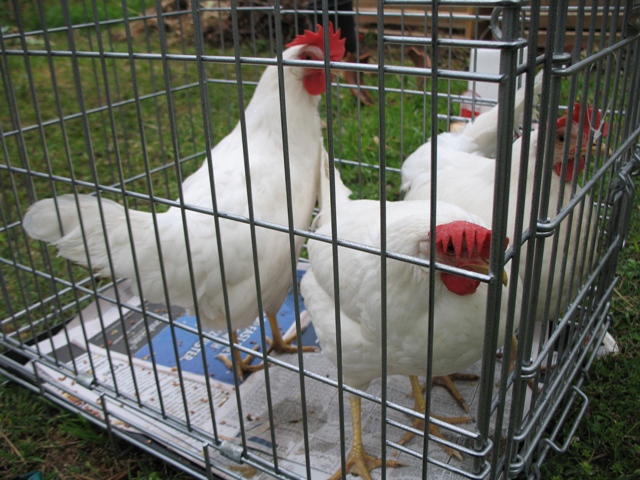
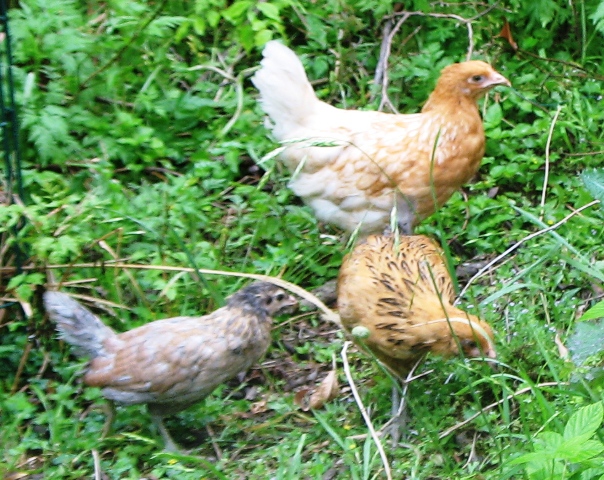
April 13, 2009
Sometimes it can be difficult to recognize when your root-hardy perennials are emerging....it's it what you planted or something else! In case you wonder what peonies look like when they are emerging from their winter sleep, here is a Peony 'Bowl of Cream' emerging to greet spring.
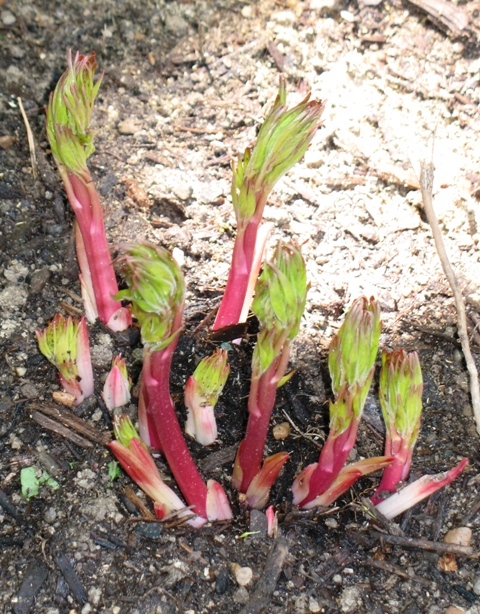
Emerging Peony
PC: Leslie F. Halleck